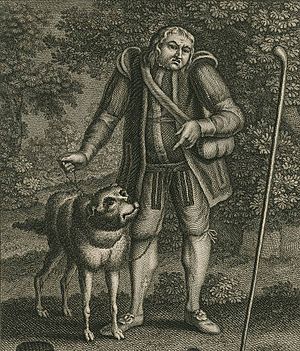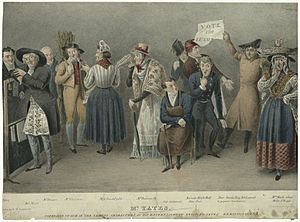Richard Yates (actor) facts for kids

Richard Yates (born around 1706, died 1796) was a very popular English actor known for his funny roles. He performed at famous places like the Haymarket Theatre and Drury Lane. He even appeared in David Garrick's play King Lear. Besides acting, he also helped manage theaters and started the New Theatre in Birmingham in 1773. Both his first wife, Elizabeth Mary, and his second wife, Mary Anne Graham, were also actresses.
Contents
Richard Yates: A Famous Actor
Early Life and Stage Beginnings
Richard Yates was born around 1706. He started his acting career in plays like Henry Fielding's Pasquin at the Haymarket Theatre. From 1737 to 1739, he performed many different roles at Covent Garden.
On September 4, 1739, he joined the Drury Lane theatre. There, he played Jeremy in Love for Love and many other funny characters. He also performed at Goodman's Fields, taking on roles like Antonio in Venice Preserved. For a special show called a "benefit" (where the actors got the money from ticket sales), he played Lovegold in The Miser. His first wife, Elizabeth Yates, also acted in smaller parts during this time.
Becoming a Star Performer
Richard Yates is thought to be the first actor to play Autolycus and Clown in All's well that ends well since the 1660s. He was also the first to play Mrs. Jewkes in a stage version of the novel Pamela; or, Virtue Rewarded in 1741. Later that year, he was the first Dick in David Garrick's Lying Valet. He returned to Drury Lane in 1742 and stayed there until 1767.
He created many original roles, including:
- Motley in The Astrologer (1744)
- Sir Robert Belmont in The Foundling (1748)
- Melchior in Gil Blas (1751)
- Puff in Taste (1752)
Working with Mary Ann Yates
In 1753, Mrs. Graham, who later became Mary Ann Yates, joined the acting company. Richard Yates started working closely with her, and they married in 1756. In his later years, it was said he often got roles because of her fame. He was the first Grumbler in 1754 and the first Grumio in Garrick's Catharine and Petruchio. He also played Wingate in The Apprentice in 1756. Around 1760, he even performed in a special show at Bartholomew Fair, playing Pantaloon in a pantomime. He was also known for playing Harlequin, another popular pantomime character.
Later Career and Retirement
After leaving Drury Lane, Richard Yates performed at Covent Garden. He played roles like Sir Benjamin Dove in Brothers (1769) and Stanley in An Hour before Marriage (1772). He also performed in Edinburgh in 1773, taking on parts like Captain Brazen and Shylock.
He returned to Drury Lane briefly in 1775. After a break from acting, he appeared at Covent Garden again in 1782 as Sir Wilful Witwoud in The Way of the World. He also played the first Sir Edmund Travers in Mysterious Husband in 1783.
Richard Yates stopped working in London after this. He performed with his wife in Edinburgh in 1784–1785 and in York in 1785. He retired with a good amount of money.
Final Years and Legacy
Richard Yates's wife, Mary Ann, passed away in 1787. He later lived with Miss Elizabeth Jones. Richard and Mary Ann Yates had also raised their great-niece and great-nephew, Thomas Yates and his sister. Thomas was expected to inherit Richard's wealth.
When Richard Yates died in 1796 at age 86, a will was presented that left most of his money to Miss Jones. This led to a big legal dispute over the will. Eventually, laws were changed to make sure all wills had to be signed and witnessed properly to be valid.
Thomas Yates's wife, Sarah Yates, became an actress herself to support her family. She performed at Drury Lane and toured in Dublin and Sheffield. Her daughter, Mary Ann Yates, later moved to New Zealand and helped found a colony there.
Richard Yates was buried with his second wife, Mary Ann, at the church of St Mary Magdalene, Richmond. He was remembered as an amazing actor, especially for his performances as funny characters in Shakespeare's plays.
 | Delilah Pierce |
 | Gordon Parks |
 | Augusta Savage |
 | Charles Ethan Porter |


